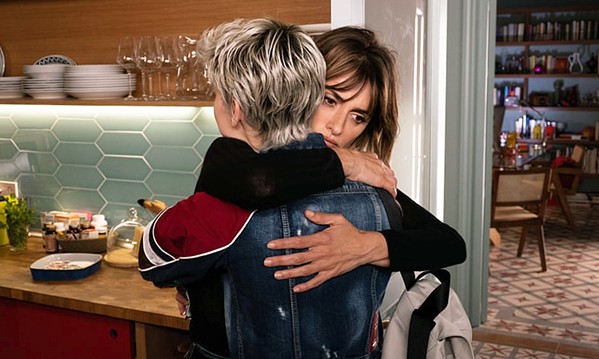Writer-director Pedro Almodóvar (Women on the Verge of a Nervous Breakdown, All About My Mother, The Skin I Live In) helms this story about two mothers—Janis (Penélope Cruz) and Ana (Milena Smit)—who give birth on the same day. (in Spanish; 123 min.)

- Photo Courtesy Of El Deseo And Pathé
- CONNECTED Janis (Penélope Cruz, right) and Ana (Milena Smit) star as two mothers who give birth on the same day, and through a twist of fate find their lives irrevocably entwined, in auteur Pedro Almadóvar's Parallel Mothers, screening in local theaters.
Glen If you're an Almodóvar fan, he's serving up more of what he's known for: melodrama, colorful sets and costumes, and surprising twists and turns. Janis is a successful commercial photographer living in a posh apartment in Madrid. During a fling with one of her subjects, forensic archaeologist Arturo (Israel Elejalde), she becomes pregnant. Almost 40 and feeling her chance at motherhood slipping away, she decides to keep the baby despite married Arturo's objections. Her roommate at the maternity ward, 17-year-old Ana, isn't as excited about the prospect of impending single motherhood, but the two bond as they simultaneously give birth, creating an intimate connection between the two women. There are surprises ahead, but they're too good to ruin with a spoiler. What I can add is that Almodóvar also has politics in mind. Janis' village was the site of a Spanish Civil War massacre, and her great-grandfather is buried in a mass grave there. She hopes Arturo will convince the government to open the grave, identify the 10 bodies, and allow their families to properly inter them. Part of what the film explores is the deep generational connections between Spanish women affected by war atrocities. The politics are essentially bookends at the beginning and ending of the film, bringing their own emotional wallop to an emotionally potent core created between Janis and Ana.
Anna There's a lot to talk about with this film, but as you said, it's pretty much impossible to stay spoiler-free in a lot of those elements, and the surprise is worth the payoff, so we won't ruin it for you here. These characters are complicated and all tortured in their individual ways. Ana's parents are too self-involved to spend much physical, let alone emotional, time with their young daughter who is just navigating the beginning stages of motherhood. Janis has a strong pull to be a mother; at nearly 40 she didn't think it was going to happen. She clearly has true feelings for Arturo but decides they must take their lives in separate directions after he expresses his wish for her to not have the child. The connection between Ana and Janis is an interesting one—strangers thrown together by circumstance and magnetically pulled to each other over time and space. Janis' desire to bring closure to her family's grief over losing her great-grandfather to the tragedies of war is such a wonderful emotional journey for the audience to embark on. I found this film pretty fascinating.
Glen This is the eighth collaboration between Almodóvar and Cruz, and they certainly bring out the best in one another. Cruz is the muse who coaxes complex female characters out of Almodóvar, and he's the one guiding her through a full range of emotions. Janis, for all her confidence, is adrift as she faces unforeseen challenges beyond motherhood. Both she and Ana traverse unfamiliar emotional ground together, learning from their pitfalls. Almodóvar also taps other frequent collaborators. The always welcome Rossy de Palma (Women on the Verge of a Nervous Breakdown and Tie Me Up! Tie Me Down!) shows up as Janis' friend Elena. She's such a striking presence! Ana's mom, the self-involved theater actress, Teresa (Aitana Sánchez-Gijón), is another complex female character given a chance to grow. Yes, there's a lot of melodrama afoot, but these characters feel like real people with real emotions. Finally, Almodóvar taps another artist he's worked with before, composer Alberto Iglesias, who creates a haunting score that reminded me of Bernard Herrmann, a favorite of Alfred Hitchcock. This is a meaty, affecting film, and it's only out in theaters. Well worth a watch.
Anna Parallel Mothers feels like it may be an easy film to skip. It's a Spanish film with a bit of a mysterious plot line, trailers that don't give a whole lot away, and only a limited release in theaters (and who's hitting the theater these days?), but it's well worth the price of a ticket and the time it takes to watch. Subtlety is key here, and Almodóvar knows how to elicit a lot with very small movements. Cruz is a striking actress, both beautiful and fierce—able to be vulnerable and hardheaded and all intricacies in between. De Palma is such a force herself, unforgettable on-screen. Smit, Sánchez-Gijón, and Elejalde are wonderful castings as well. These actors know how to build a story bigger than themselves. Catch this one while you can in theaters. If you're like me, you won't be able to take your eyes off of it. Δ
Senior Staff Writer Glen Starkey and freelancer Anna Starkey write Split Screen. Glen compiles streaming listings. Comment at [email protected].
Comments